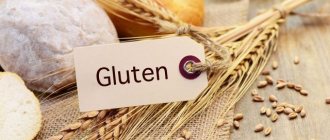There are two types of fiber
Experts recommend that adults consume about thirty grams of dietary fiber daily, but most people only get half the recommended amount. There are two types of fiber: soluble and insoluble. Both types play an important role in ensuring healthy digestion and protecting the body from various diseases. The first type of fiber dissolves in water, forming a gel that, like a sponge, absorbs acids rich in cholesterol. Then they leave the body. This cholesterol-lowering fiber is found in oatmeal, peas, beans, apples, citrus fruits, carrots, barley and fiber supplements. Insoluble dietary fiber is found in wheat bran, whole grain flour, nuts, beans, potatoes and vegetables like cauliflower or green beans. This fiber makes stool bulkier and helps waste move through the digestive tract. Insoluble fiber acts like a whisk that cleanses the intestines from the inside. So what does consuming these types of fibers do for your body? Let's study the positive effect in more detail.
An enterprising mother made edible sand. The idea was supported
NASA Parker: Get ready to see the Sun like you've never seen it before
Sweet semolina balls: a hearty breakfast recipe
Soluble fiber
Since proper nutrition requires maintaining the ratio of soluble and insoluble fiber in the diet, the pectin content in foods should be considered separately. They are found only in fresh vegetables, fruits and berries.
Their concentration largely depends on the type of crop, the period of its ripening and the place of growth, but even taking into account such deviations, it is possible to identify products in which the pectin content always remains maximum. Among them:
- currants (5.5-12.5 g);
- peaches (5-9 g);
- apples (4.5-7.5 g);
- quince (5.5-9.5 g);
- cucumbers (6-9.5 g);
- sweet pepper (6-8.5 g);
- eggplants (5.2-9 g);
- carrots (6-8 g).
Reducing cholesterol levels and the likelihood of cardiovascular disease
Eating whole grains rich in fiber will help significantly improve your blood cholesterol levels and reduce your risk of heart attack, heart attack, obesity and type 2 diabetes. Soluble fiber effectively lowers bad cholesterol levels, and also reduces the intensity of inflammatory processes in the body and stabilizes blood pressure. When such dietary fiber ends up in the intestines, it acts like a sponge, absorbing cholesterol and preventing it from entering the body. Consume oatmeal, legumes, and flaxseeds to get more of this fiber. For example, you can start the day with oatmeal - this is a great way to reduce cholesterol levels in the body.
Reducing the risk of type 2 diabetes
Due to quarantine, a married couple spent two months in a monkey sanctuary
I took a couple of sheets of cardboard, paper tape and glued the box with a drawer
Berry basket for the summer: the main trick is to get up early
Eating more fiber isn't just good for your heart, research shows it can also reduce your risk of developing type 2 diabetes. When you add fiber to your diet, your body processes carbohydrates more slowly, allowing your blood sugar levels to rise slowly. Instead of eating regular processed grains or pasta, which are quick to digest because the sugar is instantly digested, eat whole grains, which help control blood sugar.
The benefits of fiber
First of all, it is useful for the gastrointestinal tract, because due to the special structure of the fibers and their properties, this product passes through the esophagus, swelling and improving intestinal motility.
Its use is necessary for those who suffer from chronic constipation, including it can be given to children from the age of 2 years. Soluble raw materials take a long time to digest, so after eating it, a person feels full for a very long time. In this case, the weight loss effect is noticeable. In addition, the product has the ability to absorb sugar from the blood, which is indispensable for patients with diabetes.
Sucks out waste and toxins from the intestines, removes metals from the body. As it passes through the esophagus, it absorbs liquid, so be sure to drink a lot of water along with it. Benefits of use:
- Improving intestinal motility.
- Reduction of fat deposits.
- Prolonged feeling of fullness.
- Removing toxins.
- Reducing blood sugar.
- Reducing the amount of cholesterol.
- Helps with constipation.
- Promotes weight loss.
- Prevents the formation of gallstones.
A lot of fiber is found not only in vegetables and fruits, it can also be found in baked goods made from wholemeal flour, herbs, bran, berries and seeds. All these products should be consumed in large quantities, since they also contain many vitamins and microelements.
The calorie content is low, so you can consume it in large quantities, the main thing is to wash it down with water.
- Provides quick satiety without extra calories
- Reduces cholesterol and blood sugar
- Cleanses the body of toxic products.
- Prevents the appearance of gallstones.
- Eating fiber helps prevent colon and rectal cancer and cardiovascular diseases.
- Products containing large amounts of fiber contain many useful microelements that our body needs.
- Fiber significantly slows down the process of absorption of fats and carbohydrates, which in turn has a positive effect not only on scale readings, but also on blood sugar levels.
Scientists report that half a cup of oat bran per day reduces the amount of harmful substances in the body.
- It is also worth noting that fiber is the main “food” for many beneficial bacteria living in our intestines. Receiving nutrients from it, they produce enzymes and B vitamins.
If you regularly include fiber products in your menu, this will bring the following benefits to the body:
- Cholesterol levels will decrease, which is the prevention of atherosclerosis.
- Harmful substances will be removed from the body.
- The likelihood of developing gallstone disease will decrease.
- Fiber can heal the body. Thus, consuming flaxseed helps protect the walls of the stomach from harmful influences, reduces inflammation and accelerates the regeneration of minor injuries.
- Blood sugar levels decrease, which prevents diabetes.
- The intestines are naturally cleansed, as fiber gently and effectively moves food masses out, cleansing the walls of the organ.
Eating foods with fiber is a measure to prevent intestinal cancer.
Someone will ask a completely logical question - how is fiber useful and why add it to the diet if it is practically not digested? Let's figure out why this product is for our body and what benefits it brings to us.
As soon as coarse fibers enter our stomach, they immediately begin to absorb all the liquid and immediately grow in volume. Thus, a person has a feeling of satiety with food. That is, the amount of food consumed thanks to fiber decreases significantly, which is what is needed in order to lose excess weight and calories.
This point concerns more the human oral cavity, where the emergence and development of hordes of microbes occurs. When fiber gets into our mouth, we try to chew food for a long time and hard. Excessive salivation occurs and all types of pathogenic bacteria die. At the same time, destroying the chance of developing caries, periodontitis, etc.
Coarse fibers play an excellent role in the functioning of the digestive tract. Not only do natural waste products not accumulate inside us, but the intestinal walls are also stimulated. Which are able to get rid of accumulations, mucus and bacteria without external help. And, as you know, it is in the intestines and its microflora that healthy immunity is born.
Back in the 20th century, scientists made an amazing discovery. It turned out that regular consumption of fiber helps prevent the development of one of the most common and dangerous types of cancer - colorectal cancer. The reason for its occurrence is an unhealthy lifestyle, consumption of synthetic and refined products. Coarse fibers instantly rid the body of harmful food residues and restore natural, “living” microflora.
To cleanse the blood
One type of fiber is pectin, which is a prototype of a sponge with a billion membranes that block the release of toxic substances into the blood. Thanks to the properties of pectin, these substances are converted into insoluble compounds and are eliminated from the body naturally. And what is noteworthy is that the effect of coarse pectin fibers does not stop even after heat treatment.
This type of product should always be in a person’s diet, without exception for breakfast, lunch and dinner. The minimum dose is 25 grams per person. But this does not mean that you must necessarily give preference to separately sold fiber, although supplementing your dishes with grains of it also does not hurt.
Fiber is found in many plant-based delicacies, without which we cannot imagine our lives. But what happens if we stop consuming foods with coarse fibers? It’s not difficult to answer this question, because there were periods when everything natural was excluded from the diet. And people sat on crushed purees, porridges, and lean soups. After being on a fiber-free diet, people suffer:
- Gastrointestinal diseases include diarrhea, constipation, and even complete intestinal atony - the inability to perform a bowel movement without the help of tablets and enemas. Accordingly, hemorrhoids occur as a result of these problems.
- The structure of blood vessels and blood is disrupted, atherosclerosis and ischemia develop, cholesterol plaques form, which causes strokes, heart attacks, respiratory diseases, etc.
- Lack of fiber causes the development of diabetes.
- Obesity occurs.
- In most cases, after prolonged constipation, atony and hemorrhoids, a person develops rectal cancer.
Promoting weight loss and maintaining a healthy body weight
Losing weight and staying in shape is important because it will help reduce the risk of cardiovascular disease, heart attack, type 2 diabetes and many other diseases, including cancer. Losing and maintaining weight is difficult, but adding fiber to your diet can seriously help. Fiber helps you lose weight because whole grains typically have fewer calories than other foods. In addition, these calories have a longer lasting effect - fiber provides a long-lasting feeling of fullness and slows down the digestive processes. All this helps you lose weight.
The husband decided that his wife should please him. The woman wanted to teach him a lesson
“Silent” is smart, and “crybaby” is very smart: a baby’s cry is just a character
Vietnamese people love simple recipes: pickle cucumbers just like their hostesses do
Reducing the risk of developing kidney stones
Kidney stones appear sooner or later in every tenth person. In recent years, the number of patients with this problem has increased significantly, previously such cases occurred three times less often. Try to drink more water, reduce your salt intake and maintain a healthy body weight to reduce your risk of developing kidney stones. In addition, research suggests that increasing the level of dietary fiber in the diet may be beneficial - this can significantly reduce the likelihood of stone formation. Eat fiber-rich foods such as fruits and vegetables. This will make your urine less acidic, thereby creating an unfavorable environment for kidney stones.
Fresh fruits and vegetables
The highest concentration of dietary fiber is concentrated in the peel of the fruit, so all seasonal fruits must be consumed along with the top layer. If juice is prepared from them, then it must be made with pulp. Vegetables retain the most fiber when eaten raw. To do this, you can make salads from fresh ingredients.
It is recommended to eat fruits and fresh vegetables an hour before meals or 2 hours after them so that they can provide maximum benefit.
So, among soft plant foods, the largest amount of dietary fiber is concentrated in mushrooms, lentils, soybeans, beans and peas - 10-13 g per 100 g of product.
Products that contain large amounts of fiber include dried mushrooms and dried fruits. Due to the fact that there is almost no liquid in them, the concentration of fiber increases significantly. Thus, dried mushrooms already contain up to 26 g of coarse fiber, and dried fruits – 13-18 g.
Fresh fruits and berries have on average only 0.3-2 g of fiber. The exceptions are sea buckthorn - 4.7 g, black currant - 3 g and red currant - 2.5 g. Fresh vegetables also do not have a high fiber content and have an average of 1.4-7 g for every 100 g of their weight .
A lot of fiber can also be found in nuts. There, depending on the variety, the amount of substance can reach 12 g, but on average it is 7-10 g.
Maintaining a Healthy Digestive System
Regular bowel movements are important for healthy digestion. The best way to ensure normal bowel movements is to eat enough fiber. Fiber helps food move through the digestive tract, makes stools bulkier, and prevents constipation and irregular bowel movements. Research shows that a fiber-rich diet also helps prevent diverticulitis. This is a disease that occurs when a pocket forms on the intestinal wall and becomes further inflamed. The longer waste remains in the digestive system, the longer the body is exposed to toxins. This increases the risk of disease. Waste in the intestines leads to the proliferation of harmful bacteria, which can lead to problems with the digestive system.
Danger can lurk around every corner: what not to do on the day of a solar eclipse
A couple bought a house, but they weren't told that neighbors often throw parties.
They asked for help. Efremov's lawyer explained why the actor got behind the wheel drunk
Remember: everything is good in moderation
If you decide to increase your fiber intake, remember to do it gradually. If you consume too much too quickly, you will go from constipation to diarrhea. Too much fiber can cause a variety of digestive problems, from increased gas and bloating to constipation, colic, or diarrhea. If you eat one fruit or vegetable a day, double the amount and then add whole grains to your diet. Additionally, if you have diverticulitis, ulcerative colitis, or Crohn's disease, you may want to limit your fiber intake. Consult your doctor before increasing your fiber intake to prevent harm to your body.
Whole foods are better than supplements
There's no evidence to suggest that taking fiber supplements is harmful, but it's still best to get it naturally from the foods you eat because they also contain vitamins, minerals and nutrients. There are so many ways to add fiber to your daily diet. For example, you can eat whole grain cereal or oatmeal for breakfast, adding carrots, zucchini or spinach to the porridge. Sprinkle your salads with seeds and nuts, add beans to them when preparing minced meat, use lentils or vegetables with meat. When it comes to snacking, choose foods that keep you full for a long time, such as baked chickpeas. All foods you eat with the peel contain more fiber.
List of High Fiber Foods
You can get enough coarse fiber not only by taking dietary supplements, but also by increasing the amount of fiber-rich foods in your diet. It is found in the following foods.
- Bran. This is one of the leaders in dietary fiber content. They are produced during the processing of grains. In fact, they are the shell of the grain, which consists of 65% fiber. Bran is added to bread and yogurt, or sold as a separate product. You can add it yourself to food, for example porridge, by first pouring boiling water over it and letting it brew. To obtain your daily fiber intake, it is enough to consume 1 tablespoon of wheat bran 3 times a day.
- Porridge. The maximum amount of fiber is found in pearl barley, oatmeal, rice and buckwheat.
- Fruits. The peel and pulp of any of them contains fiber. To increase its consumption, do not peel the fruits and prepare the juice with pulp.
- Berries. They are also rich in dietary fiber. The more elastic they feel, the more fiber they contain.
- Vegetables. During heat treatment, fibers lose their beneficial properties. It is advisable to consume them raw, in the form of purees and freshly squeezed juices. You can prepare them from carrots, beets, celery, pumpkin, cucumber, cabbage.
- Nuts. Walnuts, hazelnuts, pistachios, almonds, and cashews are perfect.
- Greenery. To saturate your body with dietary fiber, eat spinach, celery, parsley, kenza, lettuce, sorrel, dill and any other fresh herbs.
- Legumes . All of their representatives contain fiber: beans, peas, lentils.
All of these plant-based products contain fiber. What varieties it comes in, and in what quantity nutritionists recommend consuming it, you will find out further.









